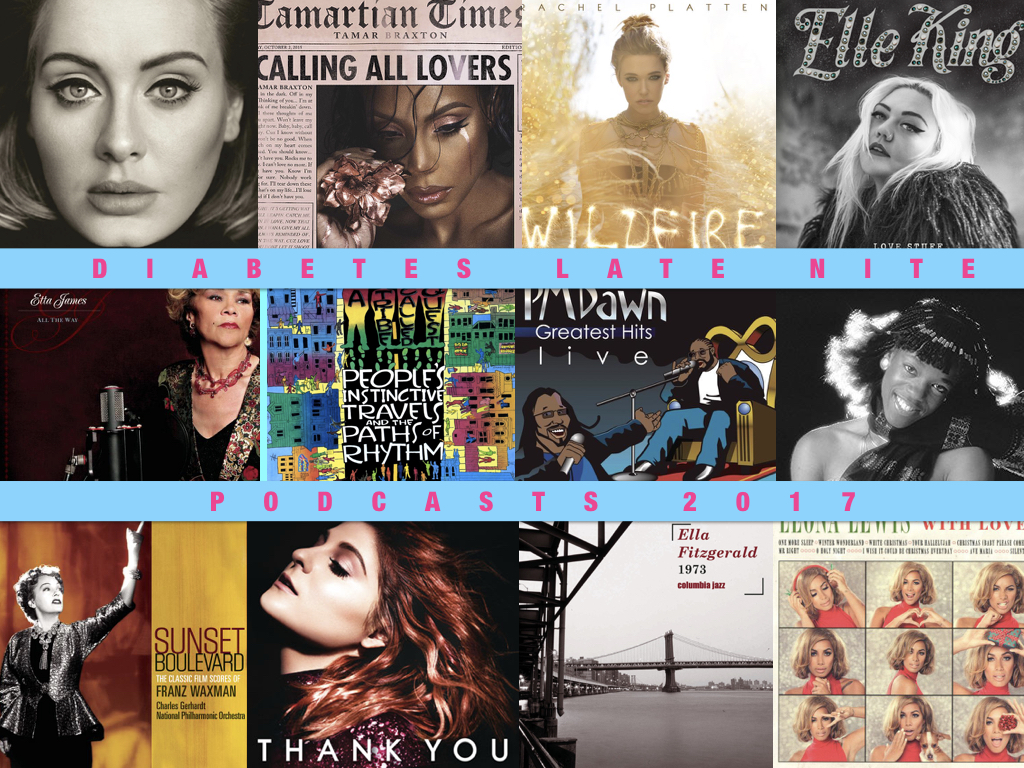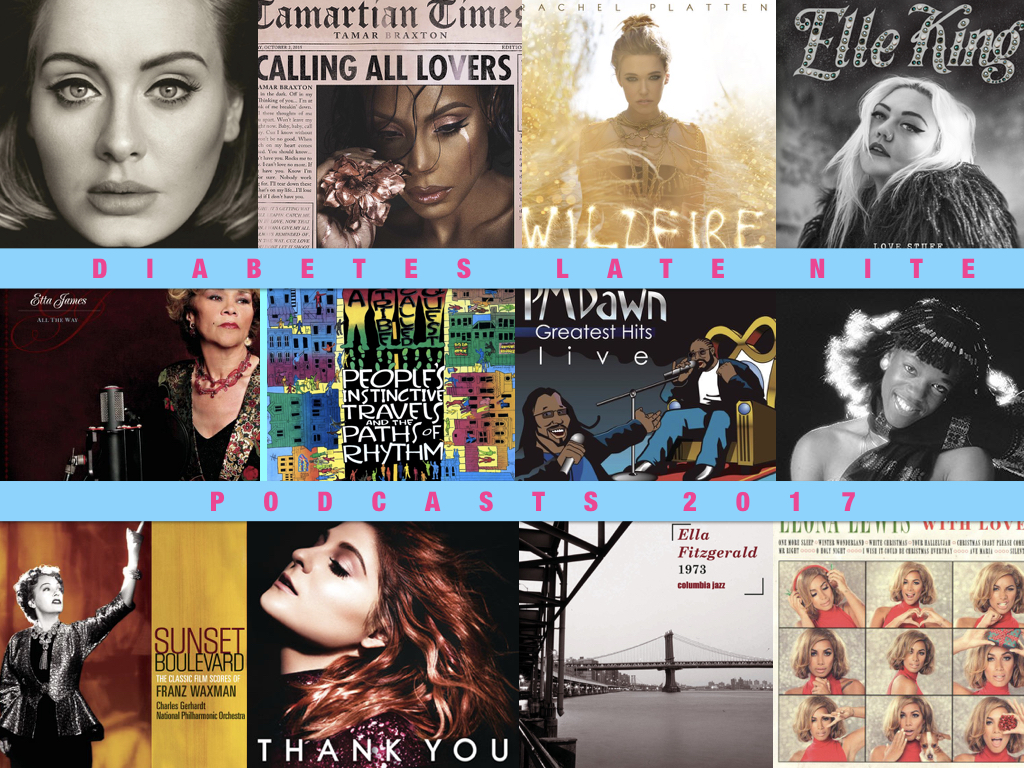Sure, it can be difficult at times to enjoy the holidays when you’re living with diabetes especially if you feel like you’re deprived of your favorite foods. Why not take the opportunity on New Year’s Day to change your mindset as well as someone else’s about what healthy tastes like?
For the past eleven years we’ve been promoting a ‘New Attitude’ about living with well diabetes to prevent a diabetes health-related complication at our live events, on our podcasts and Divabetic blog! Now we’re sharing our decade’s worth of our ‘diva brand of diabetes outreach’ advice and suggestions with you so that you won’t have to avoid the holidays in order to take charge of our diabetes.
We asked our favorite experts, Catherine Schuller AICI, CIP, ‘The Decadent Diabetic’ aka Chef Ward Arpel, Wine & Spirits Expert Samantha Shaken Baker and certified diabetes educators, Patrica Addie-Gentle RN, CDE and Susan Weiner MS, RD, CDE, CDN, to share advice on how you can kick off the New Year in style without compromising your diabetes health.
Here are our suggestions for the Perfect Bubbles, Blouse & Buffet for a “Divabetic New Year’s Day Brunch”:
First up, our good friend, the Decadent Diabetic, Chef Ward Alper to share some of his fabulous recipes to help you create a fantastic New Year’s Day Brunch. Chef Ward Alper retired to Albuquerque after being a professional chef in Boston and New York City. He blogs as “The Decadent Diabetic: Taking Back My Life and Table,” thedecadentdiabetic.com. Chef Ward is “famous” for his fantastic and festive New Year’s day buffet brunches. Chef Ward says, “the trick to entertaining with or without diabetes is to keep the food interesting and small enough for the guests not to have to fuss with balancing a drink and the food.”

Whether you are hosting a holiday gathering or have been invited to one, don’t let Diabetes get in your way. It is too easy to create something over the top delicious and low in carbohydrates, NOT just for you but for ALL your guests to savor.
If you are hosting a holiday party and Diabetes is a consideration, there are a few things to consider (beyond “Am I nuts?”)

1-Cocktails or Mocktails?
Every person with Diabetes is different in respect to alcohol. Some of us have no problem with it lowering our blood sugars, others get too low, too fast.
I suggest having both. Just make it look festive. Even sparkling water (rather than higher sodium club soda) can look really festive with a slice of lime or pineapple balanced on the top. Try diet cranberry juice blend spritzers with a slice of fruit or a spritzer of TROP 50 spritzer garnished with pineapple. You might be surprised with people saying: “I’ll have what he is having.”
2–Think dishes you can do ahead
Nothing spoils a party than having to cram hours of work in just before your guests arrive. Plan on using the same ingredients in a couple of different ways. Make the stuffings for tomatoes or mushrooms a day ahead
3-Take Ina Garten’s advice and make some, buy some.
Your invitees might be thinking: “Oh dear, Debbie has Diabetes. We will be eating rabbit food all night.” Surprise them with a platter of chunks of oven roasted turkey from the deli and jumbo olives stuffed with almonds. Do a platter of smoked salmon with a flavored whipped cream cheese. Serve these with simple homemade crackers made from low carbohydrate tortillas or Joseph’s lavash, brushed with garlic and olive oil and your favorite herb.
4- Keep it at room temperature
Why worry if Maxine is going to lose her balance in her Jimmy Cho shoes and knock over the sterno burner. Enjoy your guests and your party instead of guarding the chafing dishes.
5-How much should I make?
Depending on how many items you have on your buffet table, consider having 9-11 pieces per person, 2-4 hours event, 13-16 pieces per person; 4+ hour event, dinner replacement.
And as always this season, ENJOY, be happy, be healthy and above all…BE DECADENT.

The MENU
Our “Divabetic New Year’s Day Brunch” starts with a sharp as a tack cocktail sauce with fresh vegetables
Homemade Cocktail Sauce by The Decadent Diabetic
Makes 1 ½ cup- serves 8
carbohydrates 2 grams per Tablespoon
Chef’s notes: Most cocktail sauces for seafood are made with ketchup or chili sauce. While delicious, they have 5 grams of carbohydrates per tablespoon. This Homemade recipe is far lower with ONLY 2 grams per tablespoon. Tomato is the carbohydrate culprit here.
What you are doing with this recipe is basically making your own homemade ketchup.
6 oz. (approx. 2/3 cup) tomato paste
2 Tablespoons apple cider vinegar
2 Tablespoons sweetener of choice, or to taste
salt and pepper to tatse and your doctor’s recommendation
½ teaspoons garlic powder
¾ teaspoons onion powder
½ cup water
3- 4 tsp. prepared horse radish
How to prepare the recipe:
Place all ingredients in a bowl. Stir to blend completely.
Pistachio coated Feta and Cream Cheese Balls by The Decadent Diabetic
Makes 16 Balls
Net Carbohydrates 2 per ball
4 – ounces , shelled pistachio nuts
2- 8 0unce packages cream cheese
6- ounces Feta cheese
2- tsp. dry basil
1 -Tsp. dry oregano
1 -Tbsp. fresh parsley chopped
Note: While I usually like to use fresh herbs, this recipe gets too wet and it is hard to shape the balls and have them hold together.
I suspect that this recipe can also be made with goat cheese but my friend Peter ruined goat cheese for me by suggesting it” tasted like you were licking a goat”.
How I prepare this Recipe.
Bring cheeses to room temperature
Very simple: Chop the pistachios into very small bits and place on a dish. Combine all of the remaining ingredients. Refrigerate until firm. Using a small ice cream scoop or a tablespoon, scoop the cheese out and form into a ball. Roll the balls in the chopped pistachio nuts and chill until firm again. Serve with Lavash or tortilla chips.

Cucumber and Radish Crunches by The Decadent Diabetic
Serving size 6 pieces
Net Carbohydrates 5g.
Chef’s Note: The first time I entertained guests after my diagnosis, I went into a panic about what to make as an Hors d’ oeuvre. I came up with this very simple little bite that is so good that I never hesitate to serve it. It is a flash to prepare. I use the remaining cheese to spread on a low carbohydrate lavash or tortilla. Just roll it up and slice it to make pinwheels.
1 7-8 inch long cucumber, peeled and sliced into ½ inch thick pieces
1 8 ounce pkg.. cream cheese
1-2 Tbsp. minced shallot (or onion or scallion)
1 stalk of celery minced
5-6 radishes minced + 1-2 sliced thinly
1- Tbsp. fresh parsley, minced
Salt and pepper to taste.
How I prepare this Recipe:
Soften the cream cheese to room temperature
Mince the onion, celery radish, and parsley together and add to the softened cream cheese.
Spoon ½ tsp. of the mixture on each cucumber slice and top with ½ of a radish slice. Refrigerate until set.
Use remaining mixture on a sheet of lavash or on lavash chips or save for use on your morning toast.
There are as many variations on the filling as you have an imagination to create. Curry comes to mind as does spinach.
Divabetic Tip: Being active is your secret holiday weapon; it can help make up for eating more than usual and reduce stress during this most stressful time of year. Get moving with friends and family, such as taking a walk after a holiday meal or buffet.

Tortilla/ Lavash Baskets filled with Shrimp by The Decadent Diabetic
Makes 16 cups < 0g carbohydrate per cup
1 _ sheet JOSEPH’S lavash or low carbohydrate tortillas
2 – Tbsp. olive oil
1 – tsp. dry dill weed
1 – tsp. dry parsley flakes
½ – tsp. garlic powder
HOW I PREPARE THE RECIPE:
Pre heat oven to 375°F
Combine olive oil and spices. Brush the lavash. Pat off any excess oil from the lavash. Cut the lavash into 16 equal pieces (8 for a tortilla).
Push the pieces into a mini cupcake tin that has been sprayed with Pam.
Bake (WATCHING CAREFULLY) at 375°F for 8-10 minutes until the cups are LIGHTLY browned.
Invert cups onto a paper towel and let cool completely.
When completely cool, you can fill with recipe below, meatballs, salsa, or just use your imagination.
Roasted Shrimp with Cucumber and Dill Dressing by The Decadent Diabetic
Fills 16 cups < 0g carbohydrate per cup
2 – Tbsp. Mayonnaise
1- tsp. fresh lemon juice
zest from ½ lemon
¼ -tsp. Dijon mustard
1 – tsp. FRESH dill weed
¼ – tsp. ground black pepper
4 – ounces (after roasting) roasted shrimp
1 – medium cucumber
HOW I PREPARE THE RECIPE:
1-ROASTING SHRIMP:
Preheat oven to 400°F.
Combine raw, peeled, shrimp, 1 clove grated garlic, 1- Tsp. chopped parsley, and 1 Tbsp. olive oil. Place in one layer on a baking sheet and roast for 5 minutes at 400. Let cool before adding to the rest of the recipe.
2-SAUCE:
Combine mayonnaise, lemon juice, lemon zest, mustard, dill, and black pepper.
3-TO ASSEMBLE:
Peel cucumber. Using a teaspoon, remove any seeds. Chop cucumber into VERY small dice.
Cut shrimp into small pieces (just slightly larger than cucumber dice. Reserve any liquid in the baking sheet.
Combine Sauce, shrimp, and cucumber. Mix well and spoon into lavash cups.
No Cook Mediterranean Cheese Pate by The Decadent Diabetic
Serves 8
Net Carbohydrates 2g per serving
Chef’s Note: Don’t let the title fool you, this is a snap to make.
If you want it to look more Christmas –y, you can certainly use green olives
I suspect that this recipe can also be made with goat cheese but my friend Peter ruined goat cheese for me by suggesting it “tasted like you were licking a goat”.
3 TBSP. Chopped Sundried Tomatoes (about 6-8 pieces)
1 TBSP. olive oil
1- 8 0unce packages cream cheese
3- ounces Feta cheese
2- tsp. dry basil
1 -Tsp. dry oregano
1 -TBSP. fresh parsley chopped
½ cup pitted olives, cut in half
How I prepare this Recipe.
Combine olive oil and chopped sun dried tomatoes and set aside.
Bring cheeses to room temperature.
Using an electric beater, combine cheeses and spices. Stir in ½ of the sun dried tomatoes.
Line a 5-6 inch flat bottomed bowl (a ramekin works perfectly) with waxed paper or parchment paper.
Arrange the cut olives in a circular pattern over the bottom of the dish, rounded side down. Spoon the cheese mixture into the bowl and press down lightly to make good contact with the olives. Refrigerate at least 2 hours but over- night works as well Run a knife around the edge of the cheese and invert onto a dish. Place remaining chopped tomatoes in the center.
Plaque Assemble´e (Put it together platter) by The Decadent Diabetic
Don’t make it, assemble it. Go to the best deli/appetizer store and get meats or smoked fish or little bites like grape leaves and put it together piece by piece, bit by bit. Make it a centerpiece of beautiful food.
Cherry Tomatoes Stuffed with Crab Salad by The Decadent Diabetic
Makes 24 servings
Net Carbohydrates 2 per tomato half
Chef’s Notes: I like to do these with cocktail tomatoes. They are somewhere in size between a cherry tomato and a small tomato. If you use cherry tomatoes you will make about 36 servings.
The tomato is the thing. If crab is not in your budget, or you are allergic to shellfish, or simply don’t like crab, you can fill these with herbed or curried cheese or chicken or tuna salad and make “little” tomato surprises.
Tip: If you happen to have one of those old fashioned grapefruit spoons, it makes this a breeze. If not a sharp pointed paring knife works fine.
12 cocktail tomatoes
Or
18 cherry tomatoes
8 oz. cream cheese
8 oz. crab meat
1 tsp. drained capers
1 small shallot, minced (you can use 3 scallions instead)
Salt and pepper to taste
4 dashes of Tabasco sauce (more if you like it hotter)
HOW TO PREPARE THE RECIPE:
Cut the tomatoes in half and scoop out the insides.
Combine the remaining ingredients. Mix thoroughly.
Using either a star tipped pastry bag or a spoon, fill each tomato half. Chill so the mixture sets and the flavors meld.
Remove from the refrigerator about an hour before serving and stand back. The will disappear so fast you won’t believe your eyes.
Susan Weiner MS RDN CDE CDN and 2015 AADE Diabetes Educator of the Year is an award-winning Registered Dietitian-Nutritionist, Certified Diabetes Educator and published author. Susan offers this advice to all our ‘Divabetics’ who enjoy a buffet: Want to indulge in a few of your favorite hor d’oeuvres? Here’s a great strategy to help you stay within you calorie and carb budget: Select a few hor d’oeuvres and place them on a napkin or small plate. Stand or sit “away” from the bowl or appetizer table. Mindfully savor the flavor of your tasty appetizer while avoiding eating large quantities of these foods. Sit away from the hor d’oeuvres table and enjoy the celebration with friends and family.

Stuffed Mushrooms by The Decadent Diabetic
Net carbohydrates 3. per mushroom cap
This recipe calls for a spinach stuffing. I also use a well seasoned ground turkey (or turkey sausage) stuffing.
12 –mushroom caps (Button is fine but Baby Bella or crimini is better)
1 – pkg. chopped spinach (squeezed dry)
2 TBSP. lemon juice
¼ tsp. dry oregano or basil (or both if you like)
1 – large onion, sliced
2 tbsp. olive oil
¼ cup dried bread crumbs, divided (try panko)
¼ cup parmesan cheese, divided
salt, pepper, garlic powder, parsley to taste ( using 1/2 for the caps, 1/2 for the spinach)
HOW TO PREPARE THE RECIPE:
Preheat oven to 350°F.
Clean the mushroom caps and remove stems. Lightly salt and pepper the inside of the caps.
Sauté the sliced onion in the oil and combine with the squeezed spinach, lemon juice and half of the bread crumbs and half of the parmesan cheese, salt pepper and garlic and divide evenly among the mushroom caps. Top with remaining
bread crumbs and parmesan cheese Bake at 350 for 15-20 minutes until the cheese is lightly browned.
Chocolate Silk Tart by The Decadent Diabetic
. 8 servings
Net carbohydrates 11g.

Chef’s note: Guests ALWAYS REMEMBER DESERT. Knock their sox off with this dark chocolate confection. As a regular desert this recipe serves 8 people with people sized slices. For a party buffet, I suggest slicing it into 12-16 smaller slices.
Crust:
Spray for the pan
(9-10 inch removable bottom fluted tart pan)
2/3. Cup flour
½ cup toasted nuts (either Almonds, Walnuts, or Pecans)
¼ c. GRANULATED SUGAR SUBSTITUTE
1 pinch salt
¼ tsp cinnamon
1/8 Tsp. ground ginger
½ tsp. baking powder
4 tbsp. butter 1 large egg
FILLING:
1 pkg. cream cheese
2/3 cup GRANULATED SUGAR SUBSTITUTE
3 TBSP. coffee
2 TBP. Sour cream or heavy cream
1 tsp. pure vanilla extract
4 TBSP. Hershey’s Special Dark Cocoa powder
3 large eggs
HOW I PREPARE THE RECIPE:
In a food processor with a steel blade pulse all of the dry ingredients until very well combined and the nuts disappear into the mixture. Add cold butter and pulse until butter is well distributed in the flour mixture. Add the egg and pulse until mixture forms a ball on the blade. Remove the dough pat into a disc about 5-6’’. Wrap disc in plastic wrap and refrigerate for at least ½ hour but overnight will also work.
Roll out the crust on flowered surface to about a 14 in circle. Using your fingers fit sections of the crust into tart pan. This dough is fragile and will break. Not to worry just piece it together with your fingers. Refrigerate for 15-20 minutes before filling.
Beat cream cheese in the bowl of a food processor or electric mixer until smooth. Add GRANULATED SUGAR SUBSTITUTE and beat until incorporated. Add eggs one at a time beating well after each addition. Add the coffee, vanilla, and Sour cream. Beat until well mixed. Add the cocoa powder and mix well. Allow to sit for 20 minutes so some of the air from the beating is released (this will help keep the filling from cracking).
Pour into the crust and bake at 350°F for 25-30 minutes. Transfer to a rack and cool. Refrigerate for 2-3 hours.
 Divabetic Tip: Get Organized in 2017! From ideas on how to best store, plan for, and label things, every chapter is a treasure chest to help your blood sugars through lessened stress and better diabetes management get the advice you need in The Complete Diabetes Organizer: Your Guide to a Less Stressful and More Manageable Diabetes Life by Susan Weiner MS, RD, CDE, CDN and Leslie Josel.
Divabetic Tip: Get Organized in 2017! From ideas on how to best store, plan for, and label things, every chapter is a treasure chest to help your blood sugars through lessened stress and better diabetes management get the advice you need in The Complete Diabetes Organizer: Your Guide to a Less Stressful and More Manageable Diabetes Life by Susan Weiner MS, RD, CDE, CDN and Leslie Josel.
Divabetic Image & Style Advisor, Catherine Schuller thinks divas of all types and sizes can steal the spotlight at a New Year’s Day Brunch without breaking the bank Catherine is one of the plus size industry’s pioneers, Former Ford model, consumer advocate image consultant, author, and the creator of ‘Runway the Real Way’ fashion brunches in New York City.
Catherine’s pick for the perfect blouse for a “Divabetic New Year’s Day Brunch” is a chiffon bow tie blouse. The sheer sleeves are perfect for someone who might feel self-conscious about their upper arms. And the bow tie adds a touch of feminine ‘pizazz’ to daytime dressing. You can pair this blouse under a blazer or cardigan sweater  with a tailored skirt or trousers and still look like you’re ready to walk the Red Carpet.
with a tailored skirt or trousers and still look like you’re ready to walk the Red Carpet.
Divabetic Tip: If your eyes love stilettos but your feet don’t like wearing them then make sure to stash a pair of comfortable flats in your bag before heading out the door. According to DiabeTV.com wearing high heels can have a great toll on any woman’s feet regardless of if she is a divabetic or not. So the question is… can women with diabetes safely wear high heels? Since foot complications are very common in people with diabetes it is often stated that high heels are not recommended at all; however, there are a few exceptions to this rule. You’ll be surprised at how many stylish choices are available in flats today. After you make your grand entrance in high heels, you can quickly switch into your comfy shoes without missing a beat and stay on track with your diabetes self-care management.

Since bubbles make a New Year’s Day celebration sparkle we asked Samantha Shanken Baker, who helps presents memorable food and wine events like the Annual Harlem Eat Up!, for her recommendation. Samantha suggests you serve IRON HORSE Russian Cuvée Green Valley of Russian River Valley 2011 (retails for $45). This champagne’s brioche, baked apple and floral raspberry aromas lead to focused, rich flavors that linger with notes of cinnamon, orange zest and mineral.
Divabetic Tip: Aim to stay on top of your blood sugar. Check it more often during the holidays, and if you take medicine, ask your doctor if the amount needs to be adjusted.

My pick for a soundtrack for a “Divabetic New Year’s Day Brunch” is Maxwell’s fifth studio album, blackSUMMERSnight featuring the song, ‘Lake By The Ocean.’ Maxwell’s first offering in seven years forms the second installment of a trilogy of albums that are titled identically but for the position of the capital letters. The Grammy-winning soul man is a subeditor’s nightmare, but confusion seems a small price to pay for such a classy comeback collection of anguished R&B.
Pitchfork says, “the cool, shimmering blackSUMMERS’night is probably Maxwell’s most cohesive effort since Embrya.”
Divabetic Tip: Don’t skip meals to save up for a feast. It will be harder to keep your blood sugar in control, and you’ll be really hungry and more likely to overeat.

















 If dressing in head-to-toe lime green scares you then why not make it an accent color? Like most colors, lime green looks good with a crisp white or black. Greens are almost universally positive.
If dressing in head-to-toe lime green scares you then why not make it an accent color? Like most colors, lime green looks good with a crisp white or black. Greens are almost universally positive. Just ‘sexy enough designs’ to choose from that you might want to ditch the heels and step out in sneakers on for Date Nite. Many running shoes use of high-end fabrics and come in fabulous color palettes making them perfectly acceptable across all facets of life, from Saturday brunch to the Wedding Day! And with more design houses and celebrities jumping on the trend we will be seeing a lot more running shoes in late nightclubs.
Just ‘sexy enough designs’ to choose from that you might want to ditch the heels and step out in sneakers on for Date Nite. Many running shoes use of high-end fabrics and come in fabulous color palettes making them perfectly acceptable across all facets of life, from Saturday brunch to the Wedding Day! And with more design houses and celebrities jumping on the trend we will be seeing a lot more running shoes in late nightclubs. The OneTouch UltraMini Blood Glucose Meter has all the features you need to test your blood sugar plus it’s small enough to fit into a clutch. A simple testing process provides accurate results in just five seconds.
The OneTouch UltraMini Blood Glucose Meter has all the features you need to test your blood sugar plus it’s small enough to fit into a clutch. A simple testing process provides accurate results in just five seconds.

 “The general rule of thumb is that there are really good places to get a pedicure and there are bad places,” Williams says. “Talk to someone you know who has been to that particular spa. Make sure they practice good hygiene, that their soaking solutions are changed frequently, and their instruments sterilized before each use. If the salon doesn’t seem quite right or doesn’t look clean, don’t go back.”
“The general rule of thumb is that there are really good places to get a pedicure and there are bad places,” Williams says. “Talk to someone you know who has been to that particular spa. Make sure they practice good hygiene, that their soaking solutions are changed frequently, and their instruments sterilized before each use. If the salon doesn’t seem quite right or doesn’t look clean, don’t go back.”
 To help you determine the amount of fluid you lose during exercise, you can weigh yourself before and after exercise. For each pound lost during activity, drink 24 oz. of fluid. If your body weight increased, you have overhydrated and you should drink less fluid in future exercise sessions.
To help you determine the amount of fluid you lose during exercise, you can weigh yourself before and after exercise. For each pound lost during activity, drink 24 oz. of fluid. If your body weight increased, you have overhydrated and you should drink less fluid in future exercise sessions. Indulge in a healthy snack. Key Lime Low-Fat Yogurt with Graham Crackers and White Chocolate. Made with only natural, non-GMO ingredients.This means that ingredients like sugar are sourced from sugar cane, and not beets, which are genetically modified. The concept behind Chobani Flip isn’t new: sell a yogurt product with two compartments. The first is for “wet” ingredients, and the second is for the dry ones. So is this a healthy snack? According to the
Indulge in a healthy snack. Key Lime Low-Fat Yogurt with Graham Crackers and White Chocolate. Made with only natural, non-GMO ingredients.This means that ingredients like sugar are sourced from sugar cane, and not beets, which are genetically modified. The concept behind Chobani Flip isn’t new: sell a yogurt product with two compartments. The first is for “wet” ingredients, and the second is for the dry ones. So is this a healthy snack? According to the
















 Divabetic Tip: Get Organized in 2017! From ideas on how to best store, plan for, and label things, every chapter is a treasure chest to help your blood sugars through lessened stress and better diabetes management get the advice you need in
Divabetic Tip: Get Organized in 2017! From ideas on how to best store, plan for, and label things, every chapter is a treasure chest to help your blood sugars through lessened stress and better diabetes management get the advice you need in  with a tailored skirt or trousers and still look like you’re ready to walk the Red Carpet.
with a tailored skirt or trousers and still look like you’re ready to walk the Red Carpet. 







